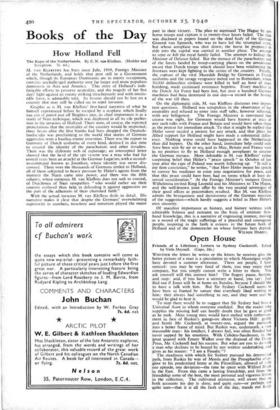Books of the Day
How Holland Fell
The Rape of the Netherlands. By E. N. vaa Kleffens. (Hodder and Stoughton. 7s. 6d.) M. VAN KLEFFENS has been since July, 1939, Foreign Minister of the Netherlands, and holds that post still in a Government which, though its European Dominions are in enemy occupation, exercises unchallenged authority over far larger and more populous dominions in Asia and America. This story of Holland's inde- fatigable efforts to preserve neutrality, and the tragedy of her five days' fight against an enemy striking treacherously and with irresis- tible force, is admirably told. Its lessons should not be lost on a country that may still be called on to repel invasion.
Graphic as is M. van Kleffens' first-hand narrative of what he himself experienced before he escaped by a seaplane which finally ran out of petrol just off Brighton pier, its chief importance is as a study of Nazi technique, which was displayed in all its vile perfec- nein in the invasion of Holland. There were, of course, the repeated protestations that the neutrality of the country would be respected; three honrs after the first bombs had been dropped the Deutsch- landsender was proclaiming to the world that stories of German aggression were a baseless enemy invention. There was the export to Germany of Dutch uniforms of every kind, destined in due time to conceal the identity of the parachutists and other invaders. There was the elaborate web of espionage; an intercepted letter showed that the head of the spy system was a man who had for several years been an attache at the German Legation, with a second- in-command known as Jonathan, whose identity was never dis- covered. There were the thousands of Germans settled in Holland, all of them subjected to heavy pressure by Hitler's agents from the moment the Nazis came into power, and there was the fifth column, whose existence M. van Kleffens does not seek to conceal, of Dutchmen of Nazi sympathies "who would rather see their country enslaved than help in defending it against aggression on the part of the adherents of their cherished faith."
With the actual invasion M. van Kleffens deals in detail. His narrative makes it clear that despite the Germans' overwhelming superiority in numbers, treachery and terrorism played the major
part in their victory. . The plan- to: iutTeund The Hague- by air- borne troops and capture it intwenty-four hours failed. The plan was disclosed in papers found wiz-the dead body Of the German General von Sponeck, who was to have led the triumphal entry, but whose aeroplane was shot down;- the horse he proposed to ride into the capital was carried in another plane. The attempt to seiZe or kill the royal family failed. The attempt to kidnap the Minister of Defence failed. But the menace of the parachutists and of the forces landed by troop-carrying planes on the aerodromes meant that Dutch troops which should have been reinforcing the frontiers were kept fighting in the centre -a the country. Finally, the capture of the vital Moerdijk Bridge- by Germans in Dutch uniforms and the savage vengeance meted out to- Rotterdam, where 30,000 defenceless civilians were killed in half an hour of mass bombing, made continued resistance hopeless. Every machine in the Dutch Air Force had been lost, but over a hundred German machines had been destroyed in one day—a record in the history
of the war till then. •
On the diplomatic side, M. Van Kleffens discusses two impor- tant questions. Holland was scrupulous in the observance of her neutrality and refused to enter into staff talks, however informal, with any belligerent. The Foreign Minister is convinced that course was right, for Germany would have known at once of any such talks with France and Britain and would have taken them as the pretext for immediate attack. To that it might be replied that Hitler never needed a pretext for any attack, and that plans for Allied support for Holland might have made a substantial differ- ence. Nothing worse could have happened to the Netherlands than did happen. On the other hand, immediate help could only have been sent by air or sea, and in May, Britain and France were in no position to fly to Holland enough aeroplanes to counter the German menace. More debatable is M. van Kleffens' rather Surprising belief that Hitler's "peace speech" in October of last year after the rape of Poland was worth following up. "It still is my firm conviction," he writes, "that Herr Hitler meant his speech to convey his readiness to enter into negotiations for peace, and that this peace could have been had on terms which at least de- served consideration." At the Foreign Minister's instance Queen .Wilhelmina invited King Leopold and his Ministers to The Hague, and the well-known joint offer by the two neutral sovereigns of their good offices as peacemakers resulted. But M. van Kleffens admits the brusqueness and decisiveness of the German rejection of the suggestion—which hardly suggests a belief in Herr Hitler's own sincerity.
' Of manifest importance as history, and history written with admirable balance and restraint on the basis of intimate first- hand knowledge, this is a narrative of engrossing interest, moving as a record of the tragic sufferings of a peaceful and courageous people, inspiring in the faith it evinces in the future both of Holland and of the democracies on whose fortunes hers depend.
WILSON HARRIS.


























 Previous page
Previous page